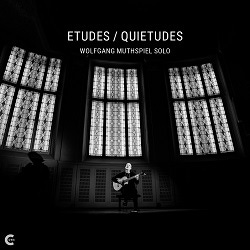Wolfgang Muthspiel - Etudes / Quietudes
(Clap Your Hands Records, 2024)
Austrian guitarist Wolfgang Muthspiel’s two previous recordings were from his successful trio with bassist Scott Colley and drummer Brian Blade: Angular Blues (ECM, 2020) and Dance Of The Elders (ECM, 2023). The guitarist opts for a new label and format on the solo exposition Etudes / Quietudes. Etudes are functional compositions intended as exercises for students, typically concentrating on a single musical element to develop skill in performance. In classical music, pianists Muzio Clementi, Johann Baptist Cramer, Ignaz Moscheles, and Carl Czerny were best known for composing etudes for student instruction. Frédéric Chopin recast the etude as an artistic statement.
Muthspiel takes both to heart. The guitarist states, “I wrote my own etudes to practise certain technical aspects. Then I fell in love with the compositional process they inspired.” Muthspiel says, “Etudes celebrate craft!" Craft is a central point for me - all the musicians I admire have spent a lifetime working on their personal sound.” Etudes / Quietudes comprises eleven etudes, each bearing a descriptive subtitle. Enigmatically, Etudes NRs 2 and 3 are missing.
"Chords" is the subtitle of Etude NR. 5; the piece made up of all chords similar to what Keith Jarrett accomplished on his recording Creation (ECM, 2015). The guitarist modulates through a series of chords, making up the composition. On Etude NR. 8 “Melting Chords,” Muthspiel plays chord groups interlaced with one another so to sound like a slow cascade. Interspersed among the Etudes is the brief piece “Triplet Droplet” which sounds exactly as titled. Following Etude NR. 13 “Arpeggio,” Muthspiel presents several short pieces.
There is the triptych made up of Bach’s “Sarabande” from his Lute Suite BWV 995) which is followed up with the guitarist’s improvisation of the Bach piece, ending with a reprise of the original composition. Thoughtful and provocative, Muthspiel ends the recital with his angular improvisation on a theme by Paul Motian entitled “Abacus.” The guitarist closes the disc with an original composition, “For Bill Evans.” This is the most melodic and dramatically dynamic of all the performances making up this fine recording.



